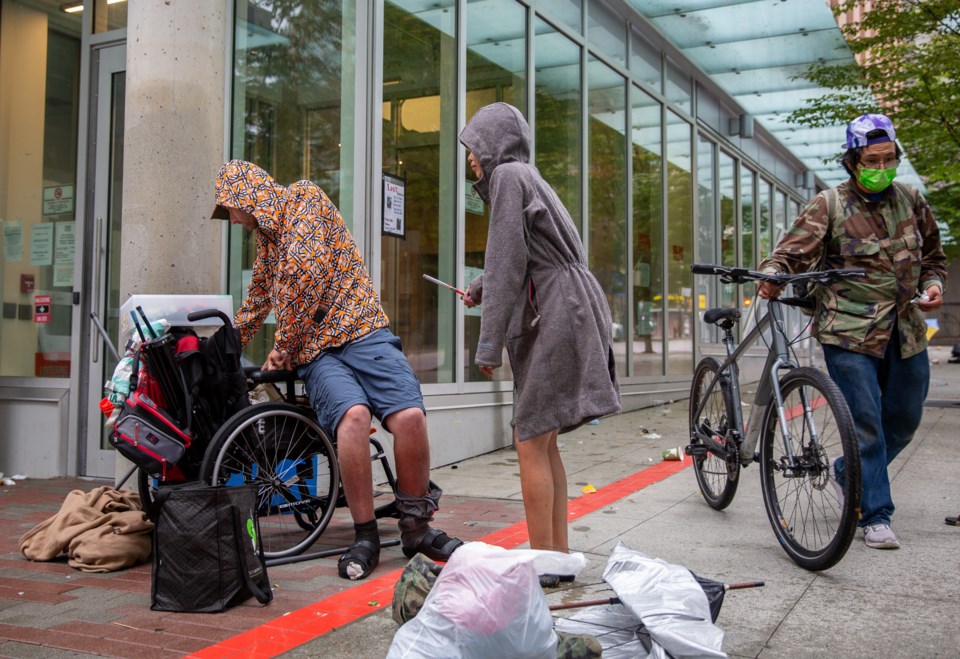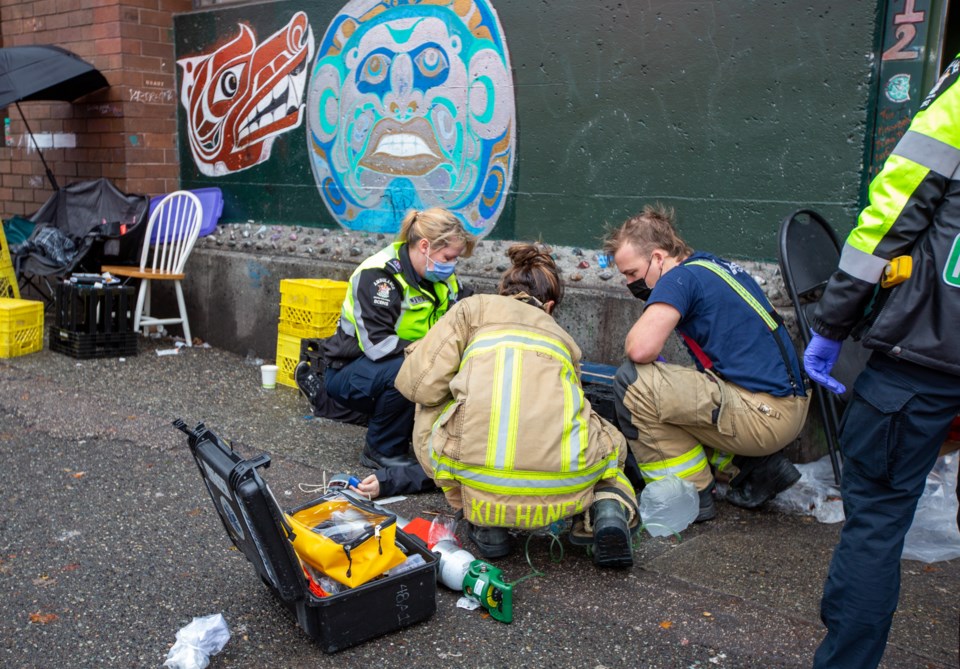Vancouver firefighters are projected to attend 9,000 drug overdose calls this year, setting another grim record for a department that has answered 24,125 such calls between Jan. 1, 2019 and Dec. 31, 2022.
The projection is outlined in the City of Vancouver’s 2024 draft budget report, which indicates 2021 was a record-setting year for overdose calls at 7,767.
That record has already fallen, with the department responding to 8,128 calls as of Nov. 27, leaving Fire Chief Karen Fry concerned about the relentless toll the crisis continues to have on drug users and firefighters.
“We have too many people dying on our streets, we have too many people dying in their homes from the overdose crisis,” Fry said Monday in advance of city council’s discussion Tuesday about the 2024 budget.
BC Coroners Service data indicates 1,785 people died in Vancouver from overdose between 2019 and 2022. The most recent data for 10 months in 2023 shows 522 drug deaths in the city, the most in the province.
Total number of deaths across B.C. at the end of October reached 2,039.

Overdoses in Yaletown
Eighty per cent of the deaths this year occurred inside, with 48 per cent at a private residence and 32 per cent in other residences such as single-room-occupancy (SRO) buildings, shelters and supportive housing.
Fentanyl and its analogues — as it has been since 2017 — has been present in more than 80 per cent of toxicology tests, often in combination with other opioids or stimulants, including cocaine and methamphetamine.
In Vancouver, overdose calls are most prevalent in the Downtown Eastside but Fry said the department has seen “a big shift” to Yaletown and surrounding streets. That shift comes as an overdose prevention site in the 1100-block Seymour Street is set to close in March 2024.
“A lot of the overdoses that we're experiencing in the Yaletown area and in the Downtown Eastside are in the SROs, in supportive housing units and on the street,” the chief said during a break Tuesday from budget discussions at city hall. “So wherever we see those move, we'll continue to see overdoses in those areas.”
Added Fry: “[The calls] are spread out everywhere, but the majority are still where most of our vulnerable people are living. It's shocking, and just that whole feeling of [firefighters] going back to see the same individuals. Just the despair is really challenging.”
Mental health program
The department is seeking a $12.5-million increase over its 2023 net operating budget of $164 million, with some of that money dedicated to hiring a total of 22 firefighters and administrative positions.
The draft budget also includes a “priority plan” for the department, which calls for its mental health program to be enhanced. The chief said there is money in the budget to fund a mental health professional — likely a counsellor or psychologist — in the new year.
In 2020, an initiative to implement a program to proactively manage the impacts of occupational stress injuries, cancer and other notable health and wellness challenges was deferred because of budget constraints caused by COVID-19.
“We have psychological oversight with a professional psychologist that we hire on contract right now part time,” Fry said. “But we'll probably try to actually bring somebody into our organization.”
The chief said the department recently trained 20 new critical incident stress management team members who meet with crews after critical events.
Wellness coordinators, an “online resiliency program,” a retreat program for firefighters and a “therapy dog” are also part of the department’s commitment to addressing firefighters’ mental health.
“There's never enough that we can do to support the wellness of our firefighters,” she said.
The department’s No. 2 fire hall in the Downtown Eastside handles the most overdose calls in the city. Burnout is real at the hall at Main and Powell streets, where firefighters can only work the equivalent of one year before they are required to relocate to another hall.
“I talk to firefighters working out of hall No. 2, and when they get to about seven months, they're done — they get numb from continually going to trauma and overdoses,” said the chief, noting many calls also have a mental health component, where the safety of patients and firefighters can be challenged.
“It can be very unpredictable at times.”
To help reduce the number of overdoses, the department partnered with Vancouver Coastal Health in 2019 to launch a program where a firefighter and outreach workers make what is the equivalent of a house call to someone who previously overdosed.
The goal of the program, which continues today, is to get people connected to treatment and services.
'A year like no other'
Lee Lax, vice-president of Vancouver Fire Fighters IAFF Local 18, told council Tuesday that 2023 has been “a year like no other” for firefighters.
“By year’s end, the fire trucks will have rolled out over 100,000 times — a new record in Vancouver,” he said.
“We will face nearly 4,500 fires. This number is staggering to us; it has doubled since 2019. In a one-day period last week, we saw firefighters face 22 fires in a 24-hour period. What remains most concerning is that we witnessed a staggering growth in overdose calls.”
Added Lax: “We are increasingly worried that if forced to work at this continued pace, we will see declining mental and physical health. We are once again in Vancouver operating in a crisis mode. It is not sustainable without significant investment in our service in the years to come.”
Lax thanked the current and previous council for committing to hire more firefighters. But he noted that they will only bring staff numbers up to what they were in the 1980s.
“In the mid-1980s in Vancouver, we had 155 firefighters on duty 24/7, and by the third quarter of next year, when these new firefighters come online, we will now just have gotten to the number of 153,” he told Glacier Media after he spoke to council.
“Firefighters today are working harder, faster and are more dedicated than any other given time.”
He said the move at the start of COVID-19 to have firefighters work 24-hour shifts has greatly benefited the department. It was a big change from working back-to-back 14-hour night shifts, said Lax, noting firefighters now have a 48-hour break to “reset” before returning to work.
Still, he said, the call load persists.
“We're going to need your support in the future,” he told council. “[The union] looks forward to supporting the fire chief and the VFRS team on its next service review and growth plan so that we can best serve the growing demands of our community.”
Council is expected to vote Dec. 12 on the city’s 2024 budget.





